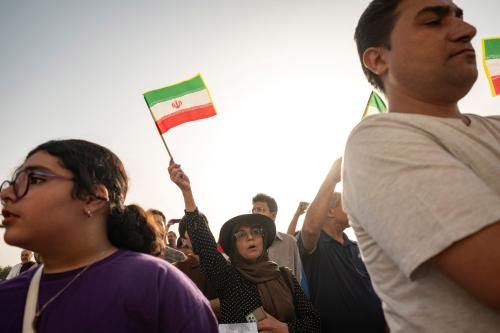At the same time that President Obama was rallying nations at the United Nations General Assembly in September to join the military coalition against ISIS (also known as the Islamic State group), he was reaffirming his administration’s determination “to stand with civil society” around the globe. Yet as the president acknowledged at the time, there is a tension between our short-term need for allies in Iraq and Syria and the longer-term imperative to expand freedoms and empower civil society elsewhere in the region to enable more positive models of governance to emerge.
Egypt may well provide the first test of the United States’ ability to reconcile these conflicting imperatives. Since the military removed former president Mohammed Morsi and his Muslim Brotherhood-led government from office following nationwide protests last July, it has cracked down harshly not only against Islamists, but also against the same revolutionary youth who orchestrated the protests that brought the military to power.
Since the June election of Egypt’s new president, former general Abdel Fattah el-Sisi, the regime’s backsliding on political and civil rights has continued unabated, and many analysts have drawn unfavorable comparisons with Hosni Mubarak’s thirty years of authoritarianism. The misrule of the Mubarak era sparked both many of the violent extremist ideologies now plaguing the region and the peaceful protests of the Arab Spring. Taking a page from Mubarak, Egypt’s military-backed regime has outlawed public demonstrations, squelched the media, and jailed thousands of political prisoners, many of whom are now on hunger strikes to protest their mistreatment and lack of due process.
Now, a showdown is brewing between the government and Egypt’s most important civic groups, which represent the professional and organizational backbone of the country’s still fledgling democracy movement. In July, the regime issued a decree requiring all NGOs to re-register under a highly restrictive law dating back to the Mubarak era. Most prominent civic groups refused to comply. The government extended the initial registration deadline until November 10, presumably to avoid a confrontation while President el-Sisi was addressing the UN General Assembly and while the UN Human Rights Council was conducting its periodic review of Egypt’s human rights record.
As that deadline passes, Egyptian civic leaders fear a brutal crackdown on civil society, with the security services shuttering the offices of prominent NGOs and arresting their leadership. Already several prominent civic activists have been forced to flee the country in response to threats of imprisonment or bodily harm.
The United States needs to stand with Egyptian civil society in the crucial weeks and months ahead. Should a crackdown occur, it would significantly damage Egypt’s prospects for returning to a democratic path. For the United States to fall back upon the “authoritarian bargain” of old in the region, where we looked the other way at what took place within Arab countries in return for their rulers’ close cooperation on security issues, would be contrary to our values and our long-term interests.
If ISIS ultimately fades into irrelevance, the United States and Arab governments need to show that there exists an alternative to the corrupt authoritarianism practiced in the past by the likes of Mubarak and Bashar al-Assad, and the barbarism proffered by ISIS. Egypt remains one of the best hopes for a more inclusive, participatory, and accountable model of governance to emerge in the Arab Middle East.
Holding firm against the Egyptian government’s encroachments upon civil society will not be easy. Yet, as President Obama noted while unveiling his “Stand for Civil Society” initiative: “The reality is sometimes… for the sake of our national security, the United States works with governments that do not fully respect the universal rights of their citizens… But that does not mean that human rights can be simply sacrificed for the sake of expediency.”
The president needs to show in Egypt that he can walk this difficult line, and advance our security interests in the Middle East without sacrificing its citizens’ future.
The Brookings Institution is committed to quality, independence, and impact.
We are supported by a diverse array of funders. In line with our values and policies, each Brookings publication represents the sole views of its author(s).




Commentary
America Must Stand With Egyptian Civil Society
November 7, 2014